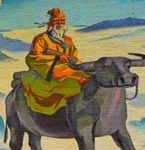Kungfucionism
Kungfucionism Philosophy
Kungfucionism is a syncretic mix of the religion Confucianism and the practice of Kung Fu. Confucianism is one of the three main religious traditions in China, along with Buddhism and Taoism. Although seen as a stern, authoritarian creed when compared with the other two, Confucianism is actually very sympathetic to the human condition. Likewise, Kung Fu also tends to be misunderstood in the West — although associated with the martial arts, Kung Fu can also refer to a disciplined approach to any art, not just the fighting arts (which are more accurately referred to as wushu). Kungfucionism, then, is a mashup of these two principal Chinese traditions, incorporating both a sense of self-mastery (Kung Fu) and a devotion to helping others and making the world a better place through the cultivation of order and humaneness (Confucianism). Though Kungfucionism tends to involve the martial arts, their specific practice is not mandatory.
Kungfucionism History
Although Confucius died before the start of the violent warring states period in China, it was still a contentious time and there was much disagreement about how to properly form the massive, burgeoning civilization that China was becoming. Whereas other political philosophers sought to obtain order and control via increasingly legalistic and authoritarian measures, Confucius envisaged a more organic, bottom-up method of growth and virtue. In developing a systematic method of organization for society, he also placed an emphasis on ren, or humane compassion. The structure, then, was made up of the official relationships and duties (royalty, officials, family), while the pith holding it all together was a warm, heart-centered compassion.
The martial arts practices known collectively as Kung Fu also arose during the time of Confucius, in the fifth century B.C.E., although legend dates it much further back (around 2000 B.C.E.). Although Kung Fu in the west is associated with the hard styles of fighting correctly known as wushu, it has always included soft meditative, non-combative disciplines such as tai chi and chi gong. There were many different styles practiced throughout China, but the first truly institutionalized variety arose with the famed Shaolin temple in 495 C.E.
Although generally associated with physical activity, Kung Fu also gave rise to a philosophical system of ethics referred to as wude (martial virtue) similar to Japanese bushido. The Taoist philosophical concept of wu wei (actionless action or non-coercive behavior) also greatly influenced the Chinese martial arts, imparting the profound notion that aggression for aggression’s sake only leads to its own destruction.
A modern day Kungfucionist marries the two ancient Chinese traditions in a way that renders them not only resilient against the vicissitudes of the world, but effective in navigating and building upon its chaos.
Kungfucionist Practice
There is a wealth of practice at hand for the Kungfucionist: from the hard combative styles of wushu, to the soft and flowing disciplines of tai chi, to the medicinal exercises of chi gong. As far as Confucian-derived rituals, there is a lot less available for those not steeped in Chinese tradition, given that most of the rituals are very culturally specific and would seem odd to those not raised with them. Despite this, the philosophical virtues espoused by Confucius are similar to those of the Buddha‘s eightfold path and the code of the bushido.
Kungfucionisms
Ever since I was a child I have had this instinctive urge for expansion and growth. To me, the function and duty of a quality human being is the sincere and honest development of one’s potential.
— Bruce Lee
It is easy to hate and it is difficult to love. This is how the whole scheme of things works. All good things are difficult to achieve; and bad things are very easy to get.
— Confucius
He who attends to his greater self becomes a great man, and he who attends to his smaller self becomes a small man.
— Mencius
To practice five things under all circumstances constitutes perfect virtue; these five are gravity, generosity of soul, sincerity, earnestness, and kindness.
— Confucius
Only when a man will not do some things is he capable of doing great things.
— Mencius
Kungfucionist Community
Get ordained as a Kungfucionist Minister







